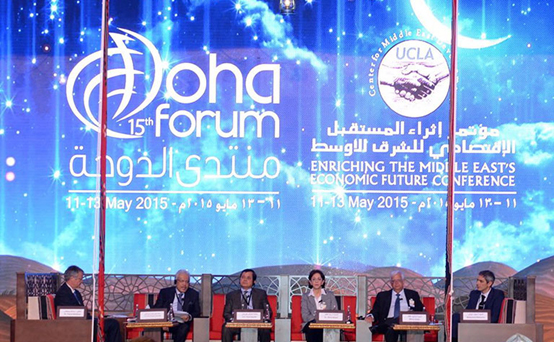news
Doha, May 12 – 2015 (QNA)

Doha Forum's 15th edition continued for the second day as it discussed the Arab spring and prospects of democratic transformation, collective security issues and regional and international stability, human development issues and human security, and economy and energy.
The human development issues and human security session discussed challenges of human development and human security in the Arab region; resource issues, distribution and population growth; and climate change and environmental pollution.
At the outset of the session, Dr. Ahmed Al Muraikhi, head of the Foreign Ministry's International Development Department, said Qatar cooperates with the international society to build a just global society based on respect of human rights, rule of law and partnership towards achieving security and stability.
Qatar offers international aid within its National Vision 2030 that goes in line with sustainable development, Al Muraikhi said, adding that Qatar will continue to participate in humanitarian and development initiatives in order to achieve international security and stability.
He pointed to Qatar's latest humanitarian aid to those affected by the recent earthquake in Nepal as well as the airlift of humanitarian aid to Djibouti and then to Yemen to assist the Yemeni people.
During the economy and energy session, Kuwait's Oil Minister Ali bin Saleh Al Omair said oil is the main artery to improving the incomes of producing countries and acts as a nourishment for all economic sectors, noting its importance in the development of human resources and the establishment of industries that meet the needs of peoples.
He added that oil will remain the main source of energy and the economy's primary engine, expecting demand for it to increase in the coming years, while maintaining it as the largest item in the balance of payments in producing countries.
In the session held under the theme of Arab spring and prospects of democratic transformation and moderated by Dr. Pascal Boniface, director of the Institute for International and Strategic Relations, participants discussed the impact of regional and international conflicts on the process of democratic transformation in Arab spring countries and Political reform and good governance in the era of the Arab spring.
Dr. Rima Khalaf, executive secretary of the United Nations Economics and Social Commission for Western Asia, strongly denied allegations that the current situation in the Arab region is the result of the Arab spring, stressing that the Arab revolutions were a reaction to the Arab state's failure and the absence of humanitarian security in many Arab countries.